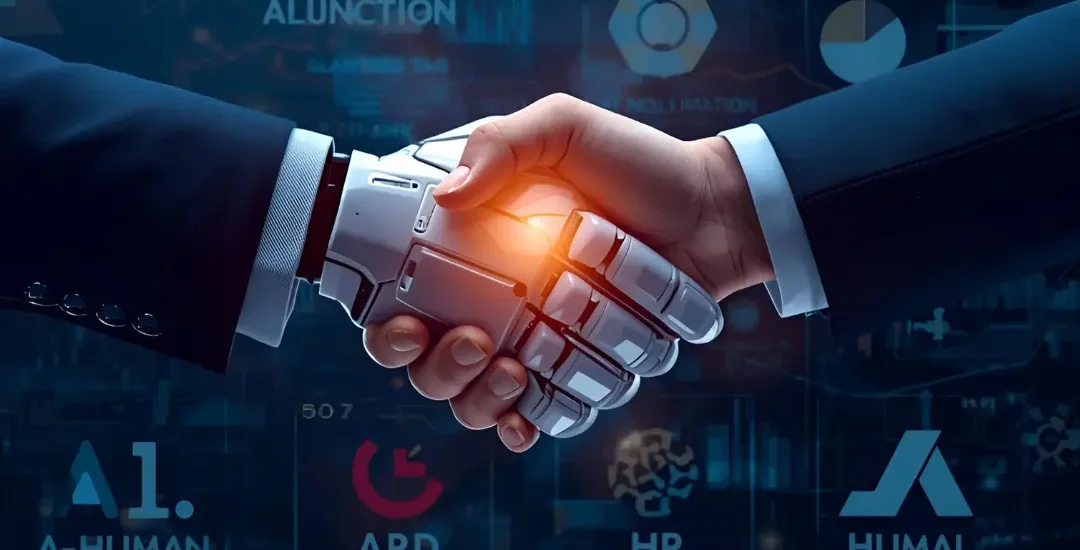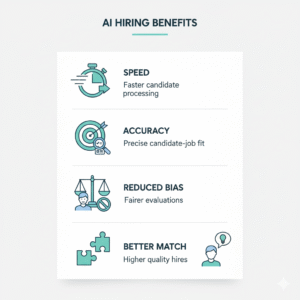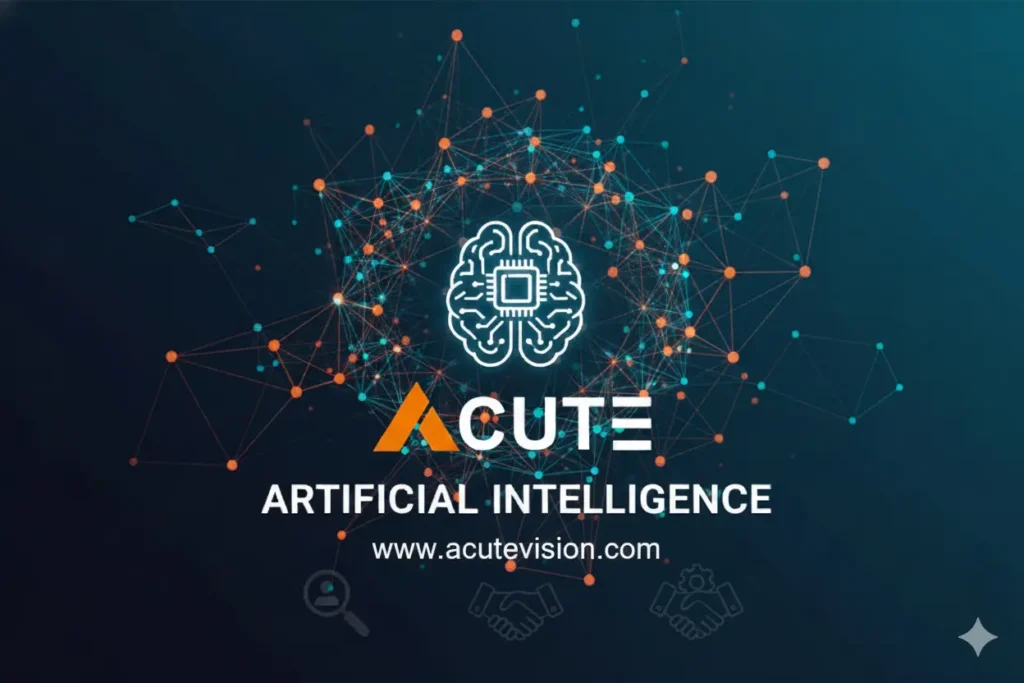- November 4, 2025
- Posted by: digital.acutevision@gmail.com
- Category: Uncategorized

AI in Recruitment: How Technology is Transforming Hiring in 2025
AI in Recruitment in 2025 the entire process of hiring will have changed significantly thanks to artificial intelligence. AI has made the work of HR and hiring managers much easier and faster. From resume screening to predicting employee retention AI is fast becoming an essential part of the toolkit for HR professionals and hiring managers.
As Indian companies work to secure the best talent in a fast-paced job market Now the hiring process is not based on gut feelings but on analyzing the data provided by the employer.we will examine how AI is transforming each stage of recruitment and why it will be a key component for shaping high-performing teams in 2025.
1. The Evolution of AI in Recruitment
A few years ago, the hiring process was very slow and manual. Recruiters had to review hundreds of resumes one by one, schedule interviews themselves, and record follow-ups—all manually.
But the time is 2025.
Now, tools make all these manual tasks easy.
Some features include
- Chatbots – which provide quick answers to people’s questions.
- Algorithms – These read resumes and find relevant experience and qualifications for the required feature skills.
- Predictive analytics – AI tools help identify candidates who will perform well and stay with the company longer.
For example Major Indian companies like Infosys, TCS, and Flipkart are using AI recruitment systems, reducing time-to-hire by approximately 60%.
2. How AI is Transforming Each Stage of the Hiring Process
a) Talent Sourcing
AI-based recruitment tools (like LinkedIn Recruiter, HireEZ, and Entelo) help recruiters find the best candidates—based not just on keywords, but on the full context (i.e., the candidate’s experience and profile background).
b) Resume Screening & Shortlisting
AI will scan thousands of resumes in a very short time and evaluate them in a bias-free manner. AI ranks resumes based on the candidate’s skills, experience, and fit with the company culture. Some tools like HireVue and Pymetrics use AI to analyze video interviews and psychometric data to predict candidate performance and suitability.
c) Interview Scheduling & Candidate Communication
AI chatbots can automate candidate communication/interaction that would otherwise have taken the recruiter time to address simple tasks such as scheduling interviews sending reminders and compiling feedback. This opens up the recruiter’s time for more strategic hiring decisions.
d) Predictive Analytics & Employee Retention
AI makes its presence in the employee lifecycle post-hiring as well. It can can now predict how long a candidate will stay on the job and manages to identify key indicators when there is an early chance of disengagement. This is leading to reduced turnover and improved workforce planning for companies across the board.
3. Benefits of Using AI in Recruitment

| Benefit | Description |
| Speed & Efficiency | AI saves time and streamlines the process by completing repetitive functions. |
| Improved Candidate Quality | AI identifies candidates who meet job requirements and fit your company culture. |
| Reduced Human Bias | Data-driven insights minimize unconscious bias in shortlisting. |
| Lower Recruitment Costs | Automation cuts manual hours and reduces overall hiring spend. |
| Enhanced Candidate Experience | Chatbots & personalization facilitate better engagement throughout each stage of the process. |
4. Challenges & Ethical Considerations
There are some difficulties and ethical challenges associated with AI which HR leaders should consider:
- Data Privacy: Protecting candidate information from being used beyond the defined context of the job.
- Algorithmic Bias: AI models need to be built on data that is fair and unbiassed.
- Human Touch: Overreliance on automation may create an impersonal feel to the work experience.
Pro Tip: Combining human experience with AI insight is the optimal way to recruit brand. It is not a replacement for human engagement.
5. The Future of AI in Recruitment (Beyond 2025)
The next phase of AI innovation in hiring will go even further
- Generative AI tools (like ChatGPT) will produce tailor-made job descriptions and outreach messages.
- Voice and emotion analytics will assess candidates’ degree of confidence and style of communication.
- AI-driven diversity tools will support the construction of more diverse teams.
- Predictive engagement models will measure candidate engagement and retention.
In short AI is evolving from just a recruitment tool into a strategic partner in HR.
Conclusion
AI has transformed the way organizations attract assess and retain talent. By adopting AI-powered recruitment tools in 2025 organizations can improve hiring efficiency accuracy and the candidate experience. The future of hiring belongs to those leaders who fuse human intelligence and AI – balancing empathy with efficiency.
👉 Want to incorporate AI into your hiring strategy? Work with acute vision and let us enhance your recruiting experience with AI technology and knowing.

Leave a Reply Cancel reply
FAQ
AI is transforming recruitment in 2025 by making the entire hiring process faster, smarter, and more data-driven.
With tools like AI chatbots, resume screening software, and predictive analytics, recruiters can quickly identify top talent and make fair hiring decisions.This technology also improves candidate experience by offering instant communication and accurate job matching.
No, AI is not replacing recruiters — it’s helping them work more efficiently.
AI takes care of repetitive tasks like sorting resumes, scheduling interviews, and shortlisting candidates, so recruiters can focus on strategic work such as understanding company needs, building relationships, and final hiring decisions.
AI plays a key role in every part of the HR process — from recruitment and onboarding to performance tracking and employee engagement.
It helps HR teams make data-backed decisions, identify the best candidates, and create a more personalized experience for employees throughout their journey in the company.
A common example of AI in recruitment is a resume screening tool that automatically filters thousands of resumes and selects the most suitable candidates based on job requirements.
Other examples include AI chatbots that answer applicant questions and video interview tools that analyze communication and skills using AI.
The future of AI in recruiting is bright and evolving.
By 2025 and beyond, AI will continue to predict candidate success, reduce hiring bias, and make recruitment more personalized.
Companies will rely more on smart analytics and automation to find the right talent faster and improve the overall quality of hiring decisions.
